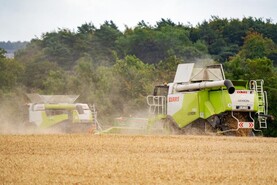Veterinary Ireland (VI) has released a set of guidelines for vets and farmers to follow this spring in order to minimise the risk of COVID-19 transmission.
“Although veterinary professionals and practices continue to provide as full a range of services as possible, it is essential that the way in which we work is provided in a manner that supports social/physical distancing and good hygiene and biosecurity,” VI said.
Guidelines
Ahead of the busy spring period, VI has issued the following guidelines:
At all times please be sure to adhere to the instructions and advice given by your vet, be that general advice given by the practice or specific advice for the vet’s visit to your premises.Try to have animals ready in a holding area to minimise the amount of time that people need to be in contact.Appropriate PPE and in particular a facemask must be worn especially when close contact is unavoidable and when people are present of farms, yards, etc, for prolonged duration, even when outdoors. Remember to socially distance: an adult cow or horse, nose to tail, is a good measure of an appropriate distance that should be maintained at all times.Elderly and vulnerable clients should make arrangements to have help on site to avoid putting themselves at risk.If you or a member of your household is isolating, restricting your movements or awaiting a test result, inform your practice at the time of placing the call. That way a safe solution can be organised. Vets
“The veterinary workforce is busy at this time of year looking after our clients and their animals. A sick vet means no vet and no vet means your animals cannot be cared for when needed,” VI said.
“By maintaining these safety measures, we can work together for a spring where your vet can continue to care for your animals at as close to full capacity as possible and where you and your family are kept safe and healthy while we await the full rollout of the vaccine that will free us from this pandemic.”
Read more
Five top tips on keeping calves healthy this spring
Number of vets in Ireland passes 3,000
Veterinary Ireland (VI) has released a set of guidelines for vets and farmers to follow this spring in order to minimise the risk of COVID-19 transmission.
“Although veterinary professionals and practices continue to provide as full a range of services as possible, it is essential that the way in which we work is provided in a manner that supports social/physical distancing and good hygiene and biosecurity,” VI said.
Guidelines
Ahead of the busy spring period, VI has issued the following guidelines:
At all times please be sure to adhere to the instructions and advice given by your vet, be that general advice given by the practice or specific advice for the vet’s visit to your premises.Try to have animals ready in a holding area to minimise the amount of time that people need to be in contact.Appropriate PPE and in particular a facemask must be worn especially when close contact is unavoidable and when people are present of farms, yards, etc, for prolonged duration, even when outdoors. Remember to socially distance: an adult cow or horse, nose to tail, is a good measure of an appropriate distance that should be maintained at all times.Elderly and vulnerable clients should make arrangements to have help on site to avoid putting themselves at risk.If you or a member of your household is isolating, restricting your movements or awaiting a test result, inform your practice at the time of placing the call. That way a safe solution can be organised. Vets
“The veterinary workforce is busy at this time of year looking after our clients and their animals. A sick vet means no vet and no vet means your animals cannot be cared for when needed,” VI said.
“By maintaining these safety measures, we can work together for a spring where your vet can continue to care for your animals at as close to full capacity as possible and where you and your family are kept safe and healthy while we await the full rollout of the vaccine that will free us from this pandemic.”
Read more
Five top tips on keeping calves healthy this spring
Number of vets in Ireland passes 3,000






 This is a subscriber-only article
This is a subscriber-only article










SHARING OPTIONS: